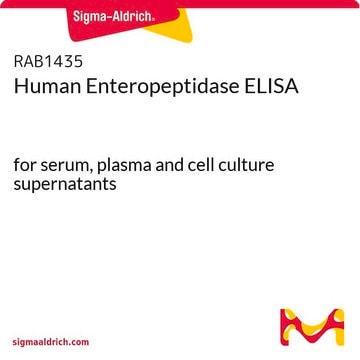50611
Atto 700 maleimide
BioReagent, suitable for fluorescence, ≥90% (coupling to thiols)
Autenticatiper visualizzare i prezzi riservati alla tua organizzazione & contrattuali
About This Item
Prodotti consigliati
Nome Commerciale
BioReagent
Saggio
≥90% (coupling to thiols)
Produttore/marchio commerciale
ATTO-TEC GmbH
Fluorescenza
λex 645 nm; λem 715 nm in 0.1 M phosphate pH 7.0
Compatibilità
suitable for fluorescence
Temperatura di conservazione
−20°C
Applicazioni
Atto 700 belongs to a new generation of fluorescent labels. The dye is designed for application in the area of life science, e.g. labeling of DNA, RNA or proteins. Maleimides are well suited for coupling to thiol groups. This is similar to iodacetamides, but maleimides do react more thiol selective. They do not show significant reaction with histidine or methionine. Hydrolysis of maleimides to a mixture of isomeric nonreactive maleamic acids can compete significantly with thiol modification, particularly above pH 8. Maleimides may be used for labeling of amines, which usually requires a higher pH than reaction of maleimides with thiols.
Note legali
This product is for Research use only. In case of intended commercialization, please contact the IP-holder (ATTO-TEC GmbH, Germany) for licensing.
Codice della classe di stoccaggio
11 - Combustible Solids
Classe di pericolosità dell'acqua (WGK)
WGK 3
Punto d’infiammabilità (°F)
Not applicable
Punto d’infiammabilità (°C)
Not applicable
Dispositivi di protezione individuale
Eyeshields, Gloves, type N95 (US)
Certificati d'analisi (COA)
Cerca il Certificati d'analisi (COA) digitando il numero di lotto/batch corrispondente. I numeri di lotto o di batch sono stampati sull'etichetta dei prodotti dopo la parola ‘Lotto’ o ‘Batch’.
Possiedi già questo prodotto?
I documenti relativi ai prodotti acquistati recentemente sono disponibili nell’Archivio dei documenti.
Multicolour single molecule imaging in cells with near infra-red dyes.
Tynan, C.J., et al.
PLoS ONE, 4, e36265-e36265 (2012)
Jan Vogelsang et al.
Photochemical & photobiological sciences : Official journal of the European Photochemistry Association and the European Society for Photobiology, 8(4), 486-496 (2009-04-02)
The role and interplay of triplet states and radical ion states in single-molecule fluorescence spectroscopy has recently been elaborated providing us with new insights into the photophysics and photobleaching pathways of fluorescent dyes. Adjustment of fluorophore redox properties in combination
Patricia Haus et al.
Journal of biomolecular screening, 16(10), 1206-1216 (2011-10-27)
Histone deacetylases (HDACs) are important epigenetic factors regulating a variety of vital cellular functions such as cell cycle progression, differentiation, cell migration, and apoptosis. Consequently, HDACs have emerged as promising targets for cancer therapy. The drugability of HDACs has been
Daniel Riester et al.
Bioorganic & medicinal chemistry letters, 19(13), 3651-3656 (2009-05-22)
Histone deacetylases reside among the most important and novel target classes in oncology. Selective lead structures are intensively developed to improve efficacy and reduce adverse effects. The common assays used so far to identify new lead structures suffer from many
Judith E Berlier et al.
The journal of histochemistry and cytochemistry : official journal of the Histochemistry Society, 51(12), 1699-1712 (2003-11-19)
Amine-reactive N-hydroxysuccinimidyl esters of Alexa Fluor fluorescent dyes with principal absorption maxima at about 555 nm, 633 nm, 647 nm, 660 nm, 680 nm, 700 nm, and 750 nm were conjugated to antibodies and other selected proteins. These conjugates were
Il team dei nostri ricercatori vanta grande esperienza in tutte le aree della ricerca quali Life Science, scienza dei materiali, sintesi chimica, cromatografia, discipline analitiche, ecc..
Contatta l'Assistenza Tecnica.




